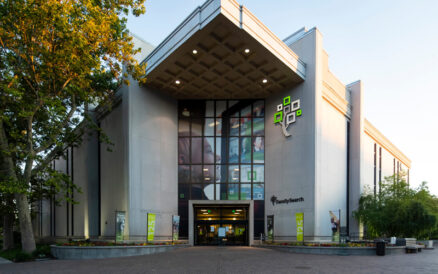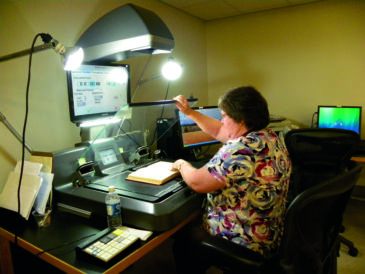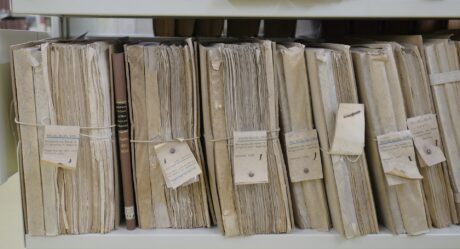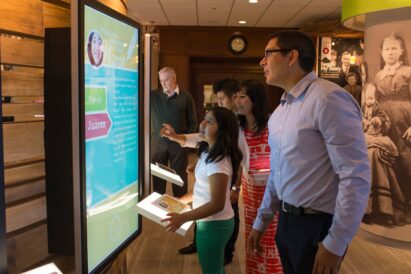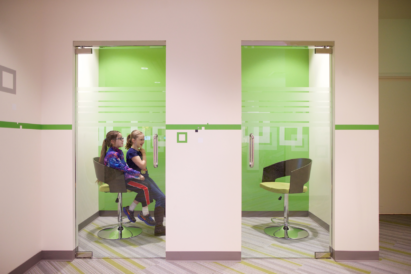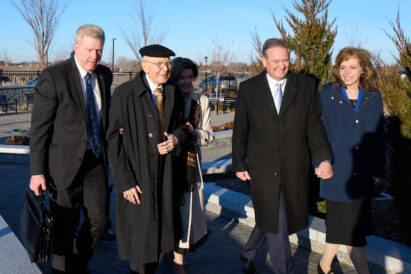Getting started with family history: Extensive resources and aid are available
- Mother and children enjoy the FamilySearch experiences in the Family History Library.
- The FamilySearch Library in Salt Lake City is the largest genealogical facility in the world.
- FamilySearch volunteers help make genealogically historical books digitally searchable online at FamilySearch.org for free.
- Historical documents wait to be digitally preserved.
- A family discovers new family connections in interactive FamilySearch discovery experience.
- Two youth sit in the FamilySearch Library’s Record My Story Booth.
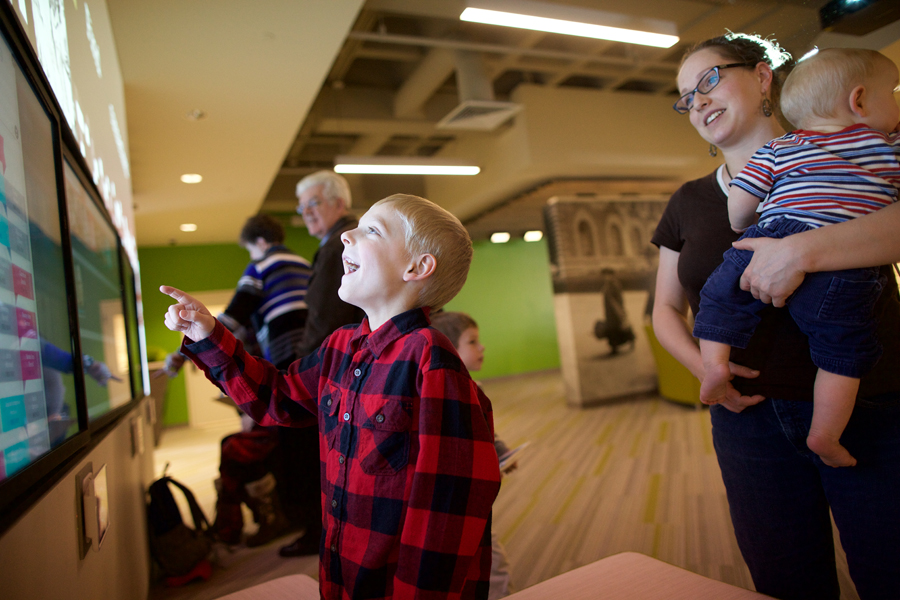
Courtesy FamilySearch.org
Mother and children enjoy the FamilySearch experiences in the Family History Library.
Many people might be interested in learning more about their ancestors but just don’t know where to begin.
Others might have family members who have been engaged in doing extensive genealogical work and might feel like there isn’t much left for them to do.
Debbie Gurtler, assistant director of the FamilySearch Library in Salt Lake City, believes individuals in both groups might be surprised at what they can do and how much they will enjoy it once they get started.
“It’s so much fun to see people discover their ancestors and get super excited,” Gurtler said in a phone interview.
Where to begin
For those in Utah who are just starting on their family history journey, Gurtler suggest going to one of the resource libraries because not only are do they feature extensive resources but they also have people to provide guidance.
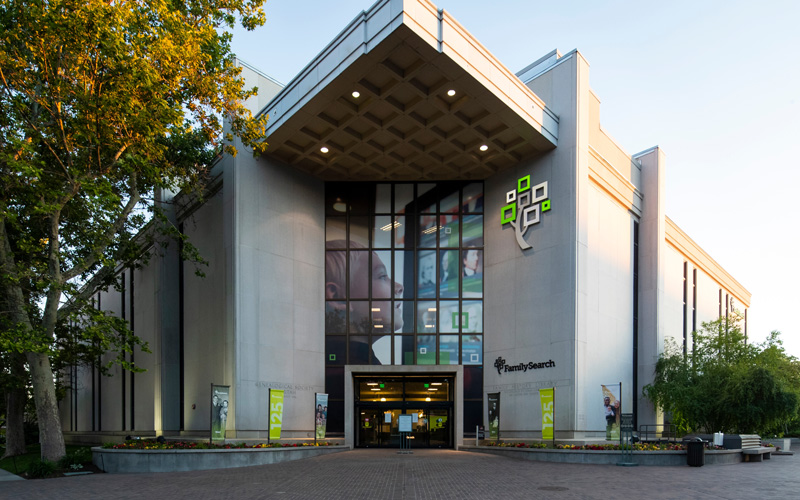
Courtesy FamilySearch.org
The FamilySearch Library in Salt Lake City is the largest genealogical facility in the world.
“The first thing you want to know is what they would like to do,” Gurtler said. “Once they say they’d like to know more about their ancestors, the next thing we do is find out where are they from and what they already know. We see if they’d like to take a look at our website and see what we can find. We’ll sit down with them and offer to help them start their family tree, so that as they come across records while they’re searching on Family Search they can add those directly to their tree.”
At the Salt Lake City library, Gurtler said they often have foreign visitors who can go to the international floor and work with speakers of other languages.
“We have a lot of visitors from other countries during the summer and during general conference, which is fun,” Gurtler said.
Like with local residents, the process starts with finding some basic information.
“They do need to know somebody who’s probably already deceased, preferably a grandparent or a great grandparent,” Gurtler said. “With this day and age of cell phones now, it’s not uncommon to see someone get on the phone in the library and call their mom and say, ‘Hey, Mom, what was your dad’s name again? When was his birthday? Where was he born?’ It’s starting first with what you know, and then going into the records to see what you can find.”
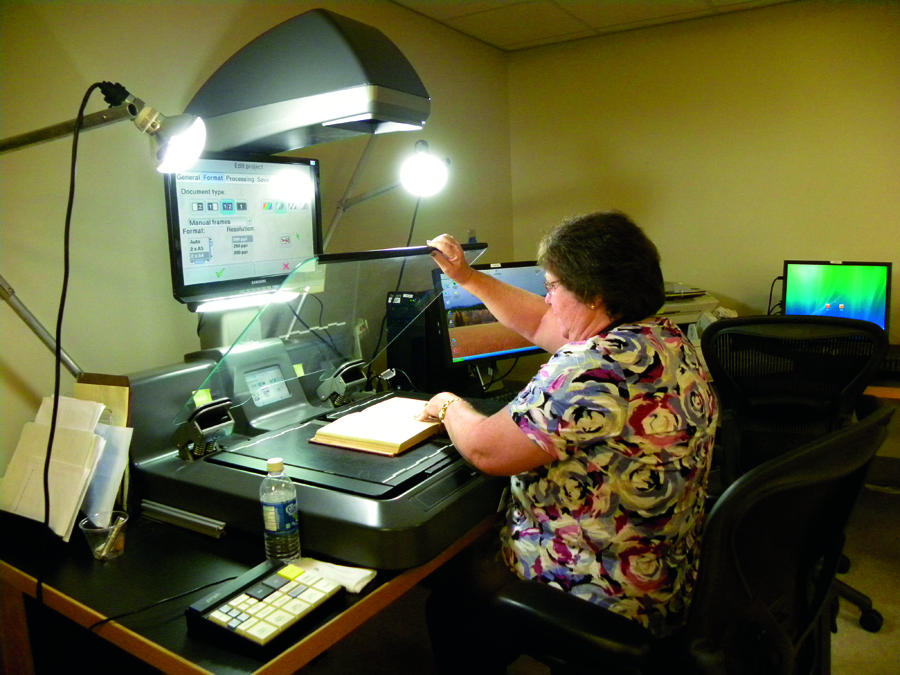
Courtesy FamilySearch.org
FamilySearch volunteers help make genealogically historical books digitally searchable online at FamilySearch.org for free.
Gurtler warns that it can be easy to get carried away by the thrill of family history discoveries. She said the library often has visitors who plan on a brief stop but end up fascinated by what they are able to learn.
“We often have people come in and we usually ask them how long they have,” Gurtler said. “They’ll say, ‘I’ve only got an hour’ and we’ll try to go a little quicker because of their time frame. But then you come back four hours later and they’re still here. They’re so enthralled. It’s wonderful to see how excited they get. Each new clue or each new record that they find that tells them more about their ancestors is just a treasure to them.”
More than just names and dates
Some families have done extensive work on genealogy and that can make it hard to feel like there is anything to add. Gurtler, however, said people in that situation might be surprised.
“There are more and more new records coming out all the time,” she said. “Maybe if your tree is already full you might be able to find some additional biographical-type information about about them in land and court records, things like that that maybe you hadn’t found before. Those are a little bit more difficult to use but thanks to new search capabilities you can go in and you can probably find some interesting court cases. I have found some interesting ones on some of my family.”
While finding records and individual names are still part of the process, modern technology and the ability to share information allows people to have a broader perspective on many of their ancestors.
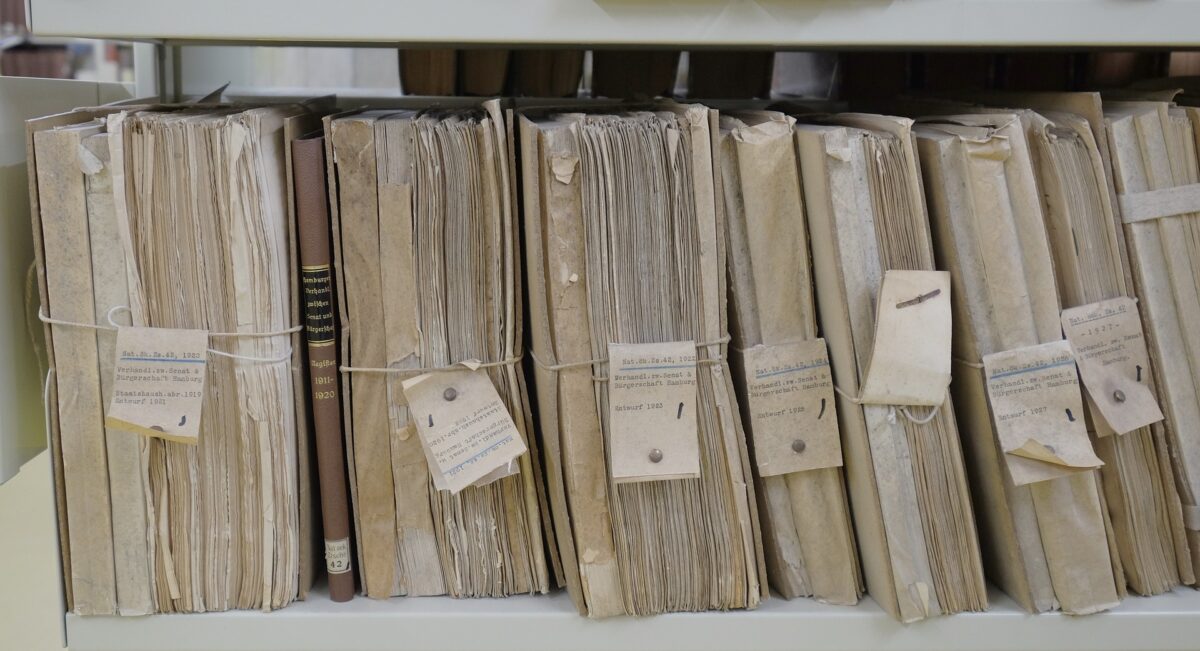
Courtesy FamilySearch.org
Historical documents wait to be digitally preserved.
“We’re not just looking for the names and dates and places,” Gurtler said. “We’re looking for what they did, what was big in their life, what influenced them. Can you see some of those things in your ancestors that have maybe trickled down to you?”
She described how she recently learned that one of her great-grandfathers spoke some of the Native American languages in the early days of Utah and now she sees some of her own children being very fluent in other languages as well.
“I keep thinking that it’s something that is in their family,” Gurtler said. “Common connections that go down through the lines is something that fascinates me, and it fascinates a lot of people, I think,”
Preservation as well as research
While the family history libraries are great places to go to delve into finding out about family members who have died, Gurtler said that they also have many resources available to help families preserve memories for future generations.
“Here in the library we have what we call Memory Lane,” Gurtler said. “It’s a family preservation center where people can bring in their old photos, their slides, their eight millimeter tapes, their cassettes, their VHS tapes, and we will help them digitize them at no charge. Then they could put it out for family. We’d love for them to put it on our site, but they could put it wherever to share it with their family and friends. I think those kinds of things also add meat to the bone, so to speak, of our family history.”
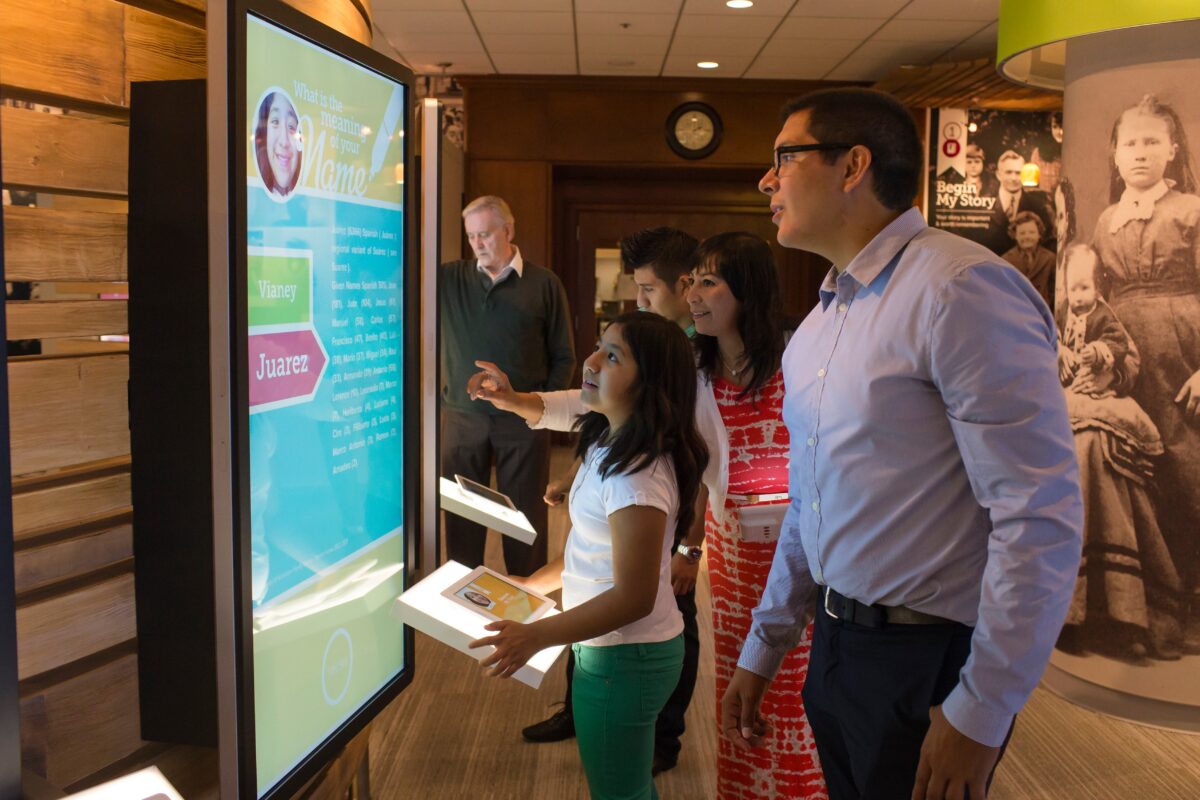
Courtesy FamilySearch.org
A family discovers new family connections in interactive FamilySearch discovery experience.
Gurtler said she also gets to see the desire to learn about family history in the younger generation as they both learn about the past and develop their research skills for the future.
“Sometimes we see families come in and Mom and Dad are ready to go home, while the kids are not quite ready to go,” she said. “We have a lot of fun things to offer for families.”
Why get started with family history
With so many demands on people’s time, it can be a challenge to find opportunities to do family history. Gurtler, however, believes there are good reasons to do so.
“I think family history can help you feel connected for those that maybe feel a little disjointed in this wild world that we live in,” she said. “For those that have children and teens, it can provide them with resilience. There’s studies that have been done that show that children who know about their ancestors and the things they went through, good and bad, make them more resilient. If they know their great-grandmother went through something and she had a hard time, they think, ‘if she made it, I can do whatever I need to to get through now.'”
She encourages people to think about their place in their families and find ways to understand and connect to them.
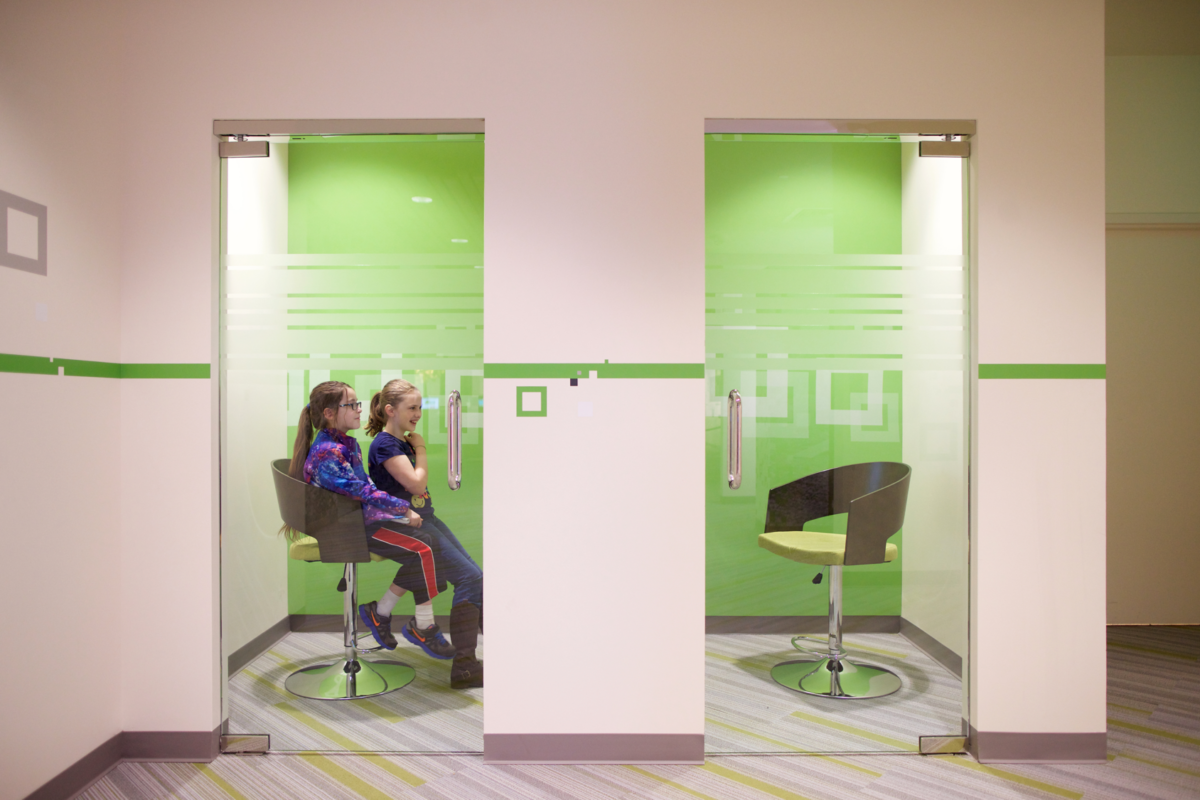
Courtesy FamilySearch.org
Two youth sit in the FamilySearch Library's Record My Story Booth.
“I would invite them, if they haven’t started to do family history, to reach out to their immediate and then extended family and see what they can find out and just start learning,” Gurtler said. “I think they’ll probably catch the bug.
“I love to go down the research rabbit hole but for those who don’t like to do research, even just talking to family and getting some of the stories down will help them feel connected to something bigger than themselves. Everybody has that desire to feel connected to something larger than themselves, to have that feeling of belonging.”
For more information on available tools and to find a family history library, go to FamilySearch.org.
Getting started checklist
- Learn some basics about your family (names, birthdates, birth locations etc.).
- Visit FamilySearch.org or a Family Search library.
- Input what you know and start making connections.
- Discover stories and information about ancestors.
- Share personal knowledge and details like photos and stories with others who are also researching their family history.


